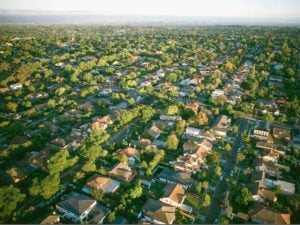Melbourne and Canberra’s property markets have officially broken the $1 million mark for median house prices during the June quarter as a ‘perfect storm’ of factors continues to drive our property prices higher again across all capital cities.

Median house prices in Canberra recorded the biggest jump in prices across all of Australia’s capital cities, at a huge 29.2% in just one year or 10.4% over the June quarter, to a new median of $1.015 million.
That means that prices soared by almost $1,054 a day over the June quarter to give a total rise of $96,000.
This is the steepest price acceleration in almost three decades, the Domain report explained.
Median house prices in the inner north, inner south, and Woden Valley are now all above seven digits.
But unit price growth has been more restrained as the development boom of recent years contains prices, although they are edging closer to a record high, up a more modest $18,000 (or 3.6%) over the June quarter to $504,217.
Interestingly, since the pandemic, Canberra house prices have risen a huge 30.9% and unit prices 9.4%, which is the highest rate of growth across all of Australia’s cities.
And it’s a similar story in Melbourne.
While Melbourne’s property prices have been steadily increasing for some time, the latest 4.1% jump of almost $41,000 over the past quarter means the city has also now joined the $1 million club and sits as Australia’s second most expensive city to buy a house.
The most affordable area to purchase a house is in the West of Greater Melbourne at $657,500 followed closely by the North West at $694,000.
Since Melbourne emerged from lockdown late-2020, house prices have risen rapidly, producing three-quarters of consecutive growth above 4 per cent - not seen since the city’s post-GFC rebound, the Domain report points out.
The bounce-back is a result of pent-up demand and changed housing needs as a result of the pandemic, with buyer sentiment spurred by cheap credit and a rebounding economy.
Unlike in Canberra, Melbourne’s unit prices have also reached a new record high of $572,793, up to $4,000 - or 4.7% - over the June quarter.
The Domain report points out that the rate of growth is subdued relative to houses, creating the biggest divergence in prices on record, which gives some opportunity for buyers unable to afford to buy a house.
By region, Melbourne’s outer east and Mornington Peninsula are the only areas with record-high unit prices.
Elsewhere, inner-city unit prices remain $27,000 below the mid-2017 high and the inner east $37,000 lower than the late-2019 peak, offering negotiation opportunities for buyers.
Capital city median house prices for the June quarter
Capital city median unit prices for the June quarter
The two cities have joined Sydney to comprise Australia’s three most expensive property markets.
The median prices in the three cities - Sydney, Canberra, and Melbourne - are now streaks ahead of the rest of the country and are responsible for dragging the national median house price also very close to the $1 million mark.
Brisbane, Adelaide, Hobart, and Darwin have all recorded new median house prices in the early to mid $600,000 range.
Meanwhile, Perth now sits at the bottom of the list, now as Australia’s most affordable city to buy a house, with a median house price of just $595,823.
This makes the cost of buying a house in Perth less than half the price of those in Sydney.
What has pushed Canberra and Melbourne over the $1 million boundary?
The results from Domain’s latest quarterly House Price Report again highlighted the perfect storm for rising house prices: low interest rates, low housing supply versus strong demand, and government stimuli.
The combination is expected to further aggravate prospective first-home buyers and upgraders who continue to be blocked out of the market as rising prices make buying property out of reach for many prospective buyers.

Buyer demand is high across Canberra auctions with supply unable to keep pace.
Competition is exemplified in the auction market, with clearance rates remaining above 80 per cent every month this year.
This is despite sellers defying the winter slowdown, with 127% more auctions scheduled over June compared with the June decade average, strong auction performance, and heightened buyer the supply of new homes up for sale has hit a multi-year low, even despite new listings tracking higher recently.
“This highlights the strong underlying demand that continues to build, shown by the Domain Buyer Demand Indicator reaching a peak in early July. This will continue to fuel price growth,” the report said.

Buyer sentiment in Melbourne has been spurred by cheap credit and a rebounding economy.
Domain CEO Jason Pellegrino said a number of factors were coming together to drive up the price of property across the country.
"What we're seeing in Australia is not unique, across the world there has been strong growth in residential property.
"The record low interest rates, prioritisation of home-life due to travel restrictions and redirection of discretionary income to pay down debt has given Australians greater buying power, driving up prices," he said.
Pellegrino said soaring house prices and lackluster pay increases could see government intervention sooner rather than later.
"With the latest wage report from ABS stating annual national wages have only increased 1.5%, we are keen to see if this recent national house price growth of 18.8% prompts action on stamp duty reform which would offer welcome relief to first home buyers," he said.














